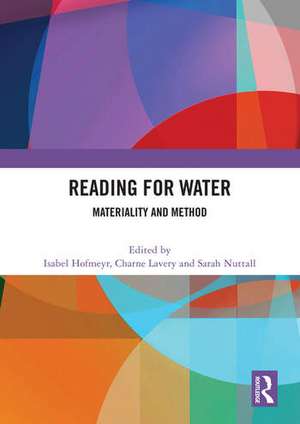Reading for Water
Editat de Isabel Hofmeyr, Charne Lavery, Sarah Nuttallen Limba Engleză Paperback – 18 dec 2024
| Toate formatele și edițiile | Preț | Express |
|---|---|---|
| Paperback (1) | 310.43 lei 3-5 săpt. | +19.09 lei 5-11 zile |
| Taylor & Francis Ltd (Sales) – 18 dec 2024 | 310.43 lei 3-5 săpt. | +19.09 lei 5-11 zile |
| Hardback (1) | 1002.32 lei 6-8 săpt. | |
| Taylor & Francis – 12 sep 2023 | 1002.32 lei 6-8 săpt. |
Preț: 310.43 lei
Nou
Puncte Express: 466
Preț estimativ în valută:
59.41€ • 61.79$ • 49.04£
59.41€ • 61.79$ • 49.04£
Carte disponibilă
Livrare economică 24 martie-07 aprilie
Livrare express 08-14 martie pentru 29.08 lei
Preluare comenzi: 021 569.72.76
Specificații
ISBN-13: 9781032516318
ISBN-10: 1032516313
Pagini: 180
Dimensiuni: 169 x 240 x 13 mm
Greutate: 0.36 kg
Editura: Taylor & Francis Ltd (Sales)
ISBN-10: 1032516313
Pagini: 180
Dimensiuni: 169 x 240 x 13 mm
Greutate: 0.36 kg
Editura: Taylor & Francis Ltd (Sales)
Notă biografică
Isabel Hofmeyr is Professor Emeritus at Wits University, based at WiSER and was Global Distinguished Professor at New York University from 2013 to 2022. Over the last three decades, she has pioneered research on global, oceanic and transnational forms of literary and cultural history that seek to understand Africa’s place in the world. Her most recent book is Dockside Reading: Hydrocolonialism and the Custom House (2022). With Charne Lavery, she co-directs the Oceanic Humanities for the Global South platform (www.oceanichumanities.com).
Charne Lavery is Senior Lecturer in the Department of English at the University of Pretoria. She is the author of Writing Ocean Worlds: Indian Ocean Fiction in English (2021), co-editor of Maritime Mobilities in Anglophone Literature and Culture (2023) and Reading from the South (2023), and co-editor of several special issues. She co-directs, with Isabel Hofmeyr, the Oceanic Humanities for the Global South platform (www.oceanichumanities.com).
Sarah Nuttall is Professor of Literary and Cultural Studies at WiSER, Wits University. For a decade, from 2012 to 2022, she was the Institute’s Director. She has taught at Yale and Duke Universities and in 2016 she was an Oppenheimer Fellow at the DuBois Institute at Harvard University. She is the author of Entanglement: Literary and Cultural Reflections on Postapartheid, editor of Beautiful/Ugly: African and Diaspora Aesthetics and Your History With Me: The Films of Penny Siopis and the co-editor of many books, including, most recently, Hinterlands: Extraction, Abandonment and Care and Reading From the South: African Print Cultures and Oceanic Turns in Isabel Hofmeyr’s Work.
Charne Lavery is Senior Lecturer in the Department of English at the University of Pretoria. She is the author of Writing Ocean Worlds: Indian Ocean Fiction in English (2021), co-editor of Maritime Mobilities in Anglophone Literature and Culture (2023) and Reading from the South (2023), and co-editor of several special issues. She co-directs, with Isabel Hofmeyr, the Oceanic Humanities for the Global South platform (www.oceanichumanities.com).
Sarah Nuttall is Professor of Literary and Cultural Studies at WiSER, Wits University. For a decade, from 2012 to 2022, she was the Institute’s Director. She has taught at Yale and Duke Universities and in 2016 she was an Oppenheimer Fellow at the DuBois Institute at Harvard University. She is the author of Entanglement: Literary and Cultural Reflections on Postapartheid, editor of Beautiful/Ugly: African and Diaspora Aesthetics and Your History With Me: The Films of Penny Siopis and the co-editor of many books, including, most recently, Hinterlands: Extraction, Abandonment and Care and Reading From the South: African Print Cultures and Oceanic Turns in Isabel Hofmeyr’s Work.
Cuprins
Introduction: Reading for Water 1. On Pluviality: Reading for Rain in Namwali Serpell’s The Old Drift 2. Hydrocolonial Johannesburg 3. Postcolonial Plumbing: Reading for Wastewater in Antjie Krog’s A Change of Tongue 4. Shadow of a Drought: Notes from Cape Town’s Water Crisis 5. A Mermaid in a Dry City: A Watery Reading of Yvonne Vera’s Butterfly Burning 6. Words on Black Water: Setting South African “Plantation Literature” Afloat on the Kala Pani 7. Dark Water: Rustum Kozain’s This Carting Life (2005) 8. “Does the Water Repeat?” Reading Caribbean-South African Contemporary Fiction 9. Is the Anthropocene Conniving with Capital? Water Priva(tisa)tion and Ontology Reimagined in Karen Jayes’ For the Mercy of Water 10. Shipwreck and Psychosis: Sheila Fugard’s The Castaways 11. Anomalous, Containerized and Inundating Waters: Thinking from the Cape and through Blue Focalization with K. Sello Duiker’s Thirteen Cents
